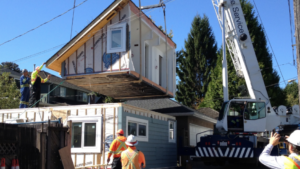
This post is a continuation of the Mobile Age of Real Estate series. Click here to start reading from the beginning.
Open data = Access… Access = Knowledge… Knowledge = Progress?
What does it mean when you have access to an ocean of information but keep it all to yourself? Everyone involved in real estate, and many who have just been trying to provide a better experience, have been asking this question when it comes to open source data from the Toronto Real Estate Board (TREB).
TREB held the largest monopoly in Canadian real estate; 50,000 of the 70,000 realtors in Ontario are members of TREB. The real estate board also owns, and manages, the Stratus MLS (Multiple Listing Service) that feeds new and active listings to TrebHome.com. Most of the real estate transactions in the province flow through their MLS system, which means almost all home sales data is property of TREB.
TREB said their concern regarding open data is for the privacy of homeowners. This is clearly nonsense. How can privacy be the concern when title information is already public knowledge through the Land Registry Office? The clearest reason for them to withhold this data is to maintain the monopoly they have spent literally decades working to protect. The fear of real estate agents becoming less relevant as a result haunts TREB and with good reason. People no longer look at realtors as the gate keepers of real estate information anymore. We are more like advisors, guiding our clients through the process at this point. Prospects often reach out to me with properties they want to see already in mind before they’ve even gone through a pre-approval. This seems like a risk to the livelihood of some TREB members. In my opinion, this risk is purely psychological. If open data will prevent an agent from serving their client to the best of their abilities then there is NO reason they should be in the business. Stifling progress for the sake of maintaining the status quo serves the interests of a privileged few. This does not move our industry forward. All it does is make us less competitive vs other markets!
In case I haven’t already made this clear, open source data is the most necessary step we need to take to progress our real estate industry. Just look at the US and the progress made with access to their MLS and some technological innovation. Like our real estate boards, the National Association of Realtors (NAR) were holding back competition by blocking MLS access to internet brokerages that offered online services. It literally took the United States Department of Justice (DOJ) to file an antitrust lawsuit in September 2005 against NAR for them to settle in 2008 and agree to give access to internet brokerages. There would be no Zillow (currently lobbying our government to feature Canadian listings on their site), Truila (owned by Zillow), or Redfin without that settlement. By providing access NAR opened the door to unheard of innovation in the real estate space, while creating opportunities for realtors to go from local to national brands.
As a Canadian, I don’t want to see more American brands taking over our space. We have plenty of home-grown talent that just needs the right juice to thrive. Canadian real estate has been in dire need for real innovation that influences the sales process. The US seems to have gotten that message a while ago, and though we are late to the party, I for one am glad we’ve arrived.
TREB attempted to drag out a battle that started in 2011 with the Competition Tribunal. A ruling was made in April 2016 that TREB’s practices of prohibiting sharing information are anti-competitive. The board also lost their appeal to the Federal Court of Appeals in December 2017 and had their appeal dismissed by the Supreme Court of Canada in September 2018. Realty brokerages are now permitted to post sales data in real-time on their password-protected websites. But all this did waste time and delay the inevitable. Progress stops for no individual, or institution, and the progress I’ve been seeing in the real estate industry blows my mind… Unfortunately, most of the innovation is south of our border…






